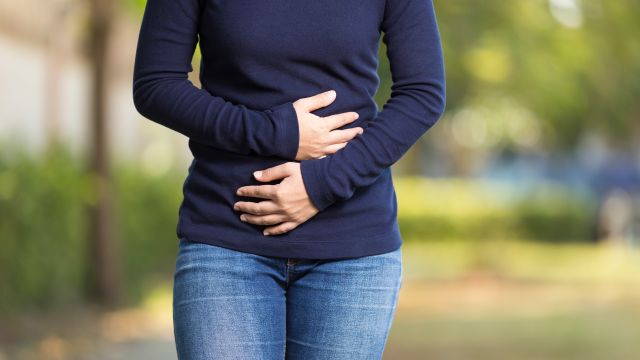Whether mild or severe, abdominal pain affects almost everyone at some point or another, but for a variety of reasons. It can be worrisome and uncomfortable, whether you’ve had it before or not. Normally, when your doctor is trying to figure out the cause of your abdominal pain, they’ll also press on your abdomen to look for abdominal tenderness, too.
“Abdominal pain and tenderness in this country is a huge problem,” says gastroenterologist Robert Shmuts, DO, of Lourdes Health System in Willingboro, New Jersey. “Millions of Americans see a physician every year for abdominal complaints." He adds that a majority of people coming to see him with abdominal pain have some sort of bowel issue like constipation or diarrhea or kidney stones, though conditions like appendicitis and certain medications can cause belly tenderness, too. Here are some of the other causes your doctor may check for.
Inflammatory bowel disease (IBD)
Inflammatory bowel disease, whether it be Crohn’s disease or ulcerative colitis, can cause abdominal cramps and pain, unwanted weight loss or diarrhea.
While ulcerative colitis only occurs in the innermost lining of the colon or large intestine, Crohn’s disease can affect any area of the gastrointestinal (GI) tract, from the mouth to the anus. With both conditions, inflammation and ulcers develop because the immune system thinks viruses, bacteria and other substances are foreign objects. Medications such as anti-inflammatory drugs and antibiotics can help relieve symptoms, though sometimes surgery is needed when other treatments aren’t helping enough.
Certain medications and alcohol
A burning sensation in the stomach may indicate peptic ulcers: open sores in the innermost lining of your stomach or small intestine. Ulcers occur when something damages the lining—either medications or an infection with certain bacteria like Helicobacter plyori—and then stomach acid causes further damage.
Paradoxically, certain nonsteroidal anti-inflammatory medications like Advil, Motrin, Aleve and aspirin may cause the inflammation, says Shmuts, as can some antibiotics and steroids. Alcohol and tobacco can worsen ulcers, and increase your risk of them, too.
Antacids, antibiotics and acid blockers may be suggested if you have ulcers.
Appendicitis
Pain on the right side of the abdomen that gets worse as time goes on may be a sign of appendicitis, or inflammation of the appendix. Other appendicitis symptoms include loss of appetite, vomiting and constipation. Treatment will almost always be an appendectomy, which is a surgery to remove the infected organ.
Endometriosis of the bowel
Shmuts says some patients who have a mother with a history of endometriosis come in with heavy rectal bleeding during periods. In addition to abdominal pain, these women show signs of endometriosis of the bowel, endometriosis on the surface of the bowel or bowel wall. Not all patients who have this condition will have a family history of edometriosis, though.
Other symptoms may include pain and straining when trying to pass a bowel movement and severe pelvic pain during sex. Painkillers can alleviate symptoms, and surgery such as laparoscopy can be used to remove affected areas of the bowel.
Peritonitis
Peritonitis, an irritation that happens when blood, body fluids or pus collects in the abdominal cavity, can cause abdominal pain that can be worse when you move around, and tenderness when the belly is touched. It can also cause your belly to look bloated and can also cause bowel trouble and excessive fatigue. Peritonitis is a very serious health condition; antibiotics will help clear up the infection and keep it from spreading. Surgery may be needed to remove the infected tissue and repair damage, especially if the rupture involves the appendix, stomach or colon.
Seek help when you have symptoms
Shmuts says that any persistent abdominal pain is worth seeing your healthcare provider about. It’s especially important to see a doctor right away if you’re having tarry, dark bowel movements since these signs may indicate you have bleeding in your GI tract, or if you’re experiencing unexplained weight loss, fevers, chills, sweating, nausea or a loss of appetite.
To determine when to see your doctor, Shmuts says he would recommend you ask yourself the following questions:
- Are these symptoms limiting your daily functions or activities?
- Are you losing weight, or do you have fevers, chills, sweats, bleeding or dark bowel
- Are there other unexplained symptoms in addition to abdominal pain, such as blurred vision, oral ulcers, rashes or easy bruising?
If the answer to any of these questions is yes, you would likely benefit from an evaluation.
Typically, your doctor will examine your abdomen perhaps even preform a rectal exam, and you may need additional testing with abdominal x-rays or other imaging, blood work, and even perhaps a colonoscopy or upper endoscopy. Based on the location of your abdominal pain and sensitivity and the results of the testing, your healthcare provider will determine and review a treatment plan that’s right for you.






